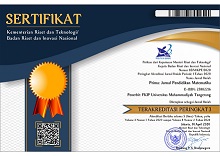TROUBLESHOOTING PROFILE SOLVING CLASS STUDENTS VII SMPN 4 PALU IN TERMS OF LEARNING STYLE
Abstract
The purpose of this research is to describe the student's problem-solving profile on the reviewed fragmentary material of the learning style. The data collection techniques used are troubleshooting tests and interviews. The results of this study are: (1) the stage of understanding the visual subject's problem is able to understand the subject well and identify the subject by rotating the important thing on the subject. The auditory subject can capture the meaning of the subject so that it can determine the sufficient condition and the necessary condition of the matter by listening to his friend at the time of reading the subject, as well as the kinesthetic subject understands the issue by turning the pencil so that he can catch the significance of the issue and can tell back the information known and asked. (2) the stage making the plan of the visual subject is able to make a plan with the information already known by describing the steps of completion on another sheet, whereas the auditory subject pronounces the strategy well with a loud voice as well as with the kinesthetic subject can make plans with the already known information but make different completion steps. (3) the stage implementing the visual, auditory and kinesthetic subject plan can complete the completion in accordance with the known information and the planned strategy, even though there are errors in the steps on the kinetical subject but the subject is capable of determining completion according to the plan.
Keywords
Full Text:
PDFReferences
Allen, C. E. dkk. (2020) “National council of teachers of mathematics,” The Arithmetic Teacher, 29(5), hal. 59. doi: 10.5951/at.29.5.0059.
Ariandi, Y. (2016). Analisis Kemampuan Pemecahan Masalah Berdasarkan Aktivitas Belajar pada Model Pembelajaran PBL. PRISMA, Prosiding Seminar Nasional Matematika, X(1996),579–585. https://journal.unnes.ac.id/sju/index.php/prisma/article/view/21561
Ariansyah (2017) Profil pemahaman konsep dan kemampuan pemecahan masalah bilangan real ditinjau dari gaya belajar siswa Kelas X SMA Al bayan makassar. Universitas Negeri Makassar.
De Porter & Mike Hernacki, B. (n.d.). Quantum Learning. PT Mizan Publika. https://books.google.co.id/books?id=6_Nx2_6T2cAC
Ilmiyah, S. dan Masriyah (2013) “Profil pemecahan masalah matematika siswa SMP pada materi peluang ditinjau dari gaya belajar,” Jurnal Mahasiswa Universitas Negeri Surabaya, 2(1). doi: 10.26740/jrpipm.v2n2.p50-61.
Kemendikbud (2019) “Pendidikan di Indonesia belajar dari hasil PISA 2018,” Pusat Penilaian Pendidikan Balitbang Kemendikbud, hal. 1–206. Tersedia pada: http://repositori.kemdikbud.go.id/id/eprint/16742.
Khoeron, I. R., Sumarna, N., & Permana, T. (2016). Pengaruh Gaya Belajar Terhadap Prestasi Belajar Peserta Didik Pada Mata Pelajaran Produktif. Journal of Mechanical Engineering Education, 1(2), 291. https://doi.org/10.17509/jmee.v1i2.3816
Polya, G. (1975) Polya: how to solve it : a new aspect of mathematical method. Diedit oleh J. H. Conway. Princeton Science Library Edition. doi: 10.1017/cbo9780511616747.007.
Rahmawati, P., & Apsari, N. (2019). Kemampuan Pemecahan Masalah Matematika Siswa Sekolah Dasar Daerah Perbatasan Entikong (Indonesia-Malaysia). UNION: Jurnal Ilmiah Pendidikan Matematika, 7(1), 49–56. https://doi.org/10.30738/union.v7i1.3135
Tampubolon, J., Atiqah, N., & Panjaitan, U. I. (2019). Pentingnya Konsep Dasar Matematika pada Kehidupan Sehari-Hari Dalam Masyarakat. Program Studi Matematika Universitas Negeri Medan, 2(3), 1–9. https://osf.io/zd8n7/download
DOI: http://dx.doi.org/10.31000/prima.v8i3.11317
Article Metrics
Abstract - 525 PDF - 699Refbacks
- There are currently no refbacks.
Prima: Jurnal Pendidikan Matematika
Program Studi Pendidikan Matematika
Fakultas Keguruan dan Ilmu Pendidikan
Universitas Muhammadiyah Tangerang
Jl. Perintis Kemerdekaan I/33, Cikokol
Kota Tangerang, Indonesia
e-mail: primajpm@gmail.com
Prima: Jurnal Pendidikan Matematika (p-ISSN: 2579-9827 | e-ISSN: 2580-2216) is licensed under a Creative Commons Attribution 4.0 International License.







